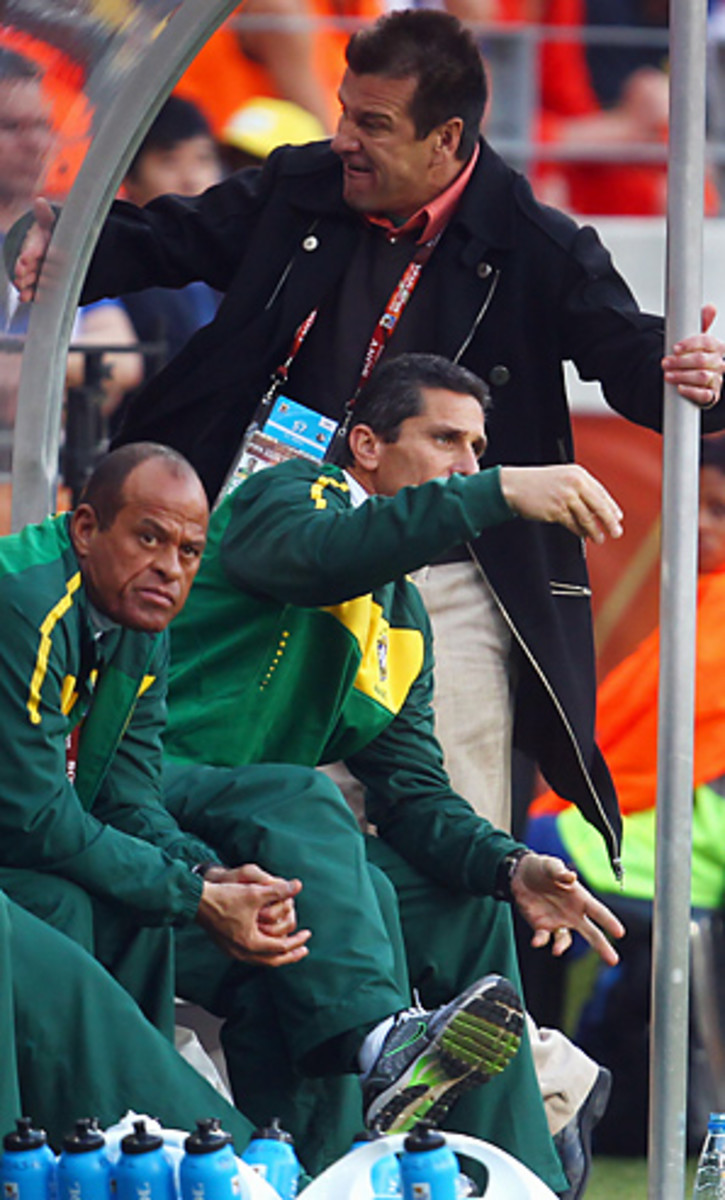Dunga fails to lead by example
Brazil went into Friday's World Cup quarterfinal against Holland with the following retrospective over the last two years -- 23 wins, 5 draws and just one defeat, with 69 goals scored and 17 conceded.
During this run, coach Dunga was often praised for forming a team of "11 Dungas" -- an entire lineup with the warrior spirit that Dunga himself exhibited in his playing days as a midfielder. In the 2-1 loss on Friday, though, that philosophy misfired badly -- at least after halftime.
In the first 45 minutes in Port Elizabeth, South Africa, many all over the planet must have believed that they were watching the future world champions. The Brazilians gave a master class. It took them less than 10 minutes to take advantage of the flat Dutch defensive line, with one of the moves that Dunga loves to train -- center forward Luis Fabiano dropping deep, pulling the defender with him and creating the space for Robinho to latch on to an excellent Felipe Melo pass and open the scoring. Brazil looked in total control. It was impossible to imagine how Holland could score.
Perhaps, though, the first alarm bells should have been ringing. Why had the team not rammed home its superiority and put the game beyond the reach of the Dutch before halftime?
That, however, has not been the style of Dunga's Brazil. It loves to take the lead and then sit deep, drawing the opposition forward and then launching one of its lightning counterattacks. For Brazil, it was a game of patience.
Sitting deep does carry an inherent risk. A mistake can be costly, as it will take place close to goal. Brazil's back line -- goalkeeper Julio Cesar and center backs Lucio and Juan -- makes very few mistakes. But eight minutes into the second half Cesar made a big one, charging unwisely out of his goal, and an attempted cross from Wesley Sneijder became the equalizing goal.
The wheels fell off at this point. Brazil was unable to get back into its first-half groove. The concept of "11 Dungas" became an enormous hindrance.
One of the major tasks of any coach is to set the emotional balance for his team. In this, at the highest level, Dunga was found sadly wanting. The signs were there in the press conference after the win over the Ivory Coast, when Dunga kept muttering insults under his breath at a TV journalist. Appointing the press as an enemy as a means to unite the team is one thing. But this looked more like a man unable to control his emotions -- an impression confirmed by his performance during the game against Holland.
Every decision against his team was greeted with a stream of expletives. He pounded the substitutes' bench in frustration. Uptight coach means uptight team.
On the field, Brazil collectively lost its head -- the most glaring symptom of which was Melo's red card for a horrible stamp on Arjen Robben. But it affected everyone. The team started making difficult things look easy.
Of course, there are tactical issues here. A central midfielder with the limited passing skills of Gilberto Silva is little help when the team is chasing the game. But this is far bigger than Silva, or even Dunga. It is the direction that Brazilian football has taken, shutting down the center of the field with battlers and initiating fast breaks down the flanks. A rethink on this would be most welcome.
And there are selection issues as well. Dunga heaped responsibility on Robinho and Kaka. The former, as so often, looked more like a petulant little kid than a potential match winner when the going got tough in the second half. And Kaka was never able to shrug off his disappointing debut season with Real Madrid.
Dunga's critics in the Brazilian press -- and there are plenty of them -- will now argue that everything would have been different had Neymar and Paulo Henrique Ganso been selected. The argument is false, and not just because it cannot be empirically tested. The two are magnificent prospects. Doing well for Santos in the Sao Paulo State Championship is one thing. The World Cup is a much greater challenge -- as the pair already discovered. Neymar flopped last year in the World Under-17 Cup, and Ganso hardly set the planet on fire in the competition at Under-20 level.
When a team loses, the best players are always those who did not play. Perhaps Ronaldinho might have been an option, and Alexandre Pato up front is a talent worth nurturing. But neither of these would have resolved the problem in central midfield.
Subjective judgments and preferences aside, the team Dunga took to the World Cup deserved to go. It had achieved two years of excellent results -- and played like it in the first half Friday. But not in the second, when Brazil's "11 Dungas" looked as emotionally unbalanced as their coach.






